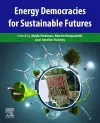
Energy Democracies for Sustainable Futures
3 contributors - Paperback
£104.00
Majia Nadesan is a professor of communication in the School of Social and Behavioral Sciences in the New College of Interdisciplinary Arts and Sciences. She received her Ph.D. in communication studies in 1993 from Purdue University after earning her B.S. and M.S. in the same subject from San Diego State University. Prior to joining the faculty at ASU's College of Human Services in 1994, Dr. Nadesan was an assistant professor at Syracuse University. She investigates the role of politics and scientific uncertainty in risk assessment across energy and sustainability literatures. She has worked extensively on Foucauldian governmentality and biopolitics. Martin Pasqualetti is a Professor of Geography in the School of Geographical Sciences and Urban Planning at Arizona State University and co-director of the Energy Policy Information Council (EPIC). He is an elected Fellow of the American Association of Geographers; a recipient of the Alexander and Ilse Melamid Medal (American Geographical Society), and the 2018 Distinguished Alumnus of the Year at the University of California (Riverside). His general research interests encompass three areas of emphasis: energy and society, energy and land use, and renewable energy development. His current research concentrates on the social acceptance of renewable energy landscapes and recycling of energy landscapes. He has served two Arizona governors as chair of the Arizona Solar Energy Advisory Council, and he was as a founding member of the Arizona Solar Center. He serves on 10 editorial boards, including Energy Research & Social Science. Jennifer Keahey is Senior Sustainability Scholar, Julie Ann Wrigley Global Institute of Sustainability and Assistant Professor of Sociology, School of Social and Behavioral Sciences, New College of Interdisciplinary Arts and Sciences. Keahey’s research centers on questions pertaining to sustainable production and trade, including the rise of the global fair trade movement, organic standards, and slow food trends. Linking political economy to sustainable development, Keahey examines the influence of sustainable trade systems on specific commodity chains and clarifies how marginal producer groups experience sustainability standards and certifications, providing insight into the less-examined dimension of social sustainability